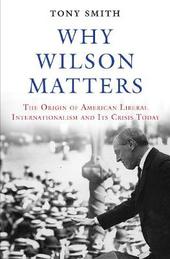
|
Why Wilson Matters: The Origin of American Liberal Internationalism and Its Crisis Today
Hardback
Main Details
| Title |
Why Wilson Matters: The Origin of American Liberal Internationalism and Its Crisis Today
|
| Authors and Contributors |
By (author) Tony Smith
|
| Series | Princeton Studies in International History and Politics |
|---|
| Physical Properties |
| Format:Hardback | | Pages:352 | | Dimensions(mm): Height 235,Width 152 |
|
| ISBN/Barcode |
9780691171678
|
| Classifications | Dewey:327.73009045 |
|---|
| Audience | | Tertiary Education (US: College) | | Professional & Vocational | |
|---|
|
Publishing Details |
| Publisher |
Princeton University Press
|
| Imprint |
Princeton University Press
|
| Publication Date |
10 January 2017 |
| Publication Country |
United States
|
Description
The liberal internationalist tradition is credited with America's greatest triumphs as a world power--and also its biggest failures. Beginning in the 1940s, imbued with the spirit of Woodrow Wilson's efforts at the League of Nations to "make the world safe for democracy," the United States steered a course in world affairs that would eventually win
Author Biography
Tony Smith is the Cornelia M. Jackson Professor of Political Science at Tufts University. His many books include America's Mission: The United States and the Worldwide Struggle for Democracy and The Crisis of American Foreign Policy: Wilsonianism in the Twenty-First Century (both Princeton).
Reviews"A painstaking, take-no-prisoners attack on those who believe that America's historical experience can be duplicated everywhere... This makes for powerful reading."--Robert Kaplan, Wall Street Journal "A valiant effort to assert that Woodrow Wilson's view of how America should relate to the world has relevance today... Smith performs a service to readers looking to place current domestic political developments in historical context."--Publishers Weekly "[Smith] wants to reclaim Wilson's historical memory to bolster the very idea of liberal internationalism, which he correctly considers under assault. For Smith, the problem is not that the United States stands for liberal values and seeks to promote democracy abroad; for too many, doing so has become synonymous with military force and overthrowing governments. The association of Wilson's precepts with the recent wars in Iraq, Afghanistan and Libya has caused many to question the wisdom of a vigorous American role in the world. The result, Smith argues, is that 'neo-Wilsonianism sabotaged the very tradition from which it had emerged.'"--Derek Chollet, The National Interest
|